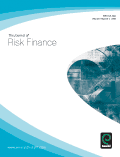
Journal of Risk Finance
Scope & Guideline
Empowering research for informed financial decisions.
Introduction
Aims and Scopes
- Risk Assessment and Management:
The journal emphasizes methodologies for assessing and managing financial risks, including credit, market, and operational risks. Research often incorporates quantitative models to evaluate risk exposure and develop strategies for mitigation. - Impact of Economic and Political Factors:
A core area of focus is the influence of economic conditions, political stability, and regulatory changes on financial markets and institutions. Papers frequently explore how these factors affect investment decisions and market behavior. - Sustainable Finance and ESG Considerations:
The journal highlights the growing importance of environmental, social, and governance (ESG) factors in finance. Research often examines the role of sustainable finance in promoting corporate responsibility and its impact on investment performance. - Innovations in Financial Technology (Fintech):
The journal explores the implications of fintech innovations, such as cryptocurrencies and digital banking, on traditional financial systems. This includes studies on the adoption of new technologies and their effects on market dynamics. - Global Financial Markets and Crisis Analysis:
Research frequently addresses the interconnectedness of global financial markets, particularly in times of crisis. Topics include the spillover effects of geopolitical events and economic shocks on market stability.
Trending and Emerging
- Cryptocurrency and Blockchain Analysis:
The increasing interest in cryptocurrencies and blockchain technology is evident, with research exploring their role in financial markets, risk management practices, and investment strategies. - Impact of Geopolitical Events on Financial Stability:
There is a notable trend towards examining the effects of geopolitical tensions, such as the Russia-Ukraine conflict, on market behavior and risk dynamics, highlighting the importance of understanding global interconnectedness. - Sustainable and Responsible Investment Practices:
The focus on sustainable finance and ESG considerations is growing, with research investigating how these factors influence investment decisions, corporate governance, and overall market performance. - Behavioral Finance Insights:
Emerging studies are increasingly incorporating behavioral finance elements to explain investor behavior and market reactions, particularly in response to crises and uncertainty. - Advanced Risk Modelling Techniques:
There is a rising trend in the use of sophisticated quantitative models and machine learning techniques for risk assessment, reflecting the need for more robust methodologies in a rapidly evolving financial landscape.
Declining or Waning
- Traditional Banking Models:
Research focused on conventional banking practices and risk management has become less frequent, as the industry increasingly pivots towards digitalization and fintech solutions. - Historical Financial Crises Analysis:
The emphasis on analyzing past financial crises has waned, with more attention now directed towards emerging risks and the implications of current geopolitical events. - Narrowly Defined Risk Metrics:
Studies that concentrate solely on traditional risk metrics, such as standard deviation or beta, have decreased, likely due to a broader recognition of the need for comprehensive risk assessment frameworks that include qualitative factors.
Similar Journals

Journal of Structured Finance
Transforming Ideas into Financial StrategiesThe Journal of Structured Finance, published by PAGEANT MEDIA LTD, is a pivotal resource for professionals and academics engaged in the finance sector. With its ISSN 1551-9783 and E-ISSN 2374-1325, this journal explores cutting-edge concepts in structured finance, offering insights into risk management, financial derivatives, and innovative financing strategies. As of 2023, it proudly holds a Q3 ranking in the finance category, with a Scopus rank of #280 out of 317, contributing valuable perspectives in a competitive field. Operating from the United States and serving a global audience, the journal encourages research that bridges theoretical foundations and practical applications, enhancing the understanding of complex financial instruments. With no Open Access options currently available, readers can access this valuable content through institutional subscriptions or individual purchases, reaffirming its relevance and importance for researchers, professionals, and students alike who seek to navigate the dynamic world of finance.
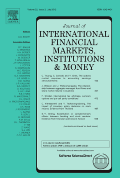
Journal of International Financial Markets Institutions & Money
Connecting Theory and Practice in FinanceThe Journal of International Financial Markets, Institutions & Money, published by Elsevier, serves as a leading platform for the dissemination of high-quality research in the fields of finance, economics, and econometrics. With an impressive impact factor reflected in its status as a Q1 journal in both categories for 2023, it ranks among the top journals, positioned at #47 out of 317 in Finance and #111 out of 716 in Economics. This journal offers a unique focus on the interplay between financial markets and institutions on a global scale, making it an essential resource for scholars, practitioners, and students alike. The journal welcomes innovative theoretical, empirical, and applied research, contributing to an exciting dialogue that shapes the future of international finance. For researchers looking to publish their findings, this journal is committed to rigorously engaging with contemporary financial phenomena, positioning itself as a vital cornerstone of academic and professional discourse.
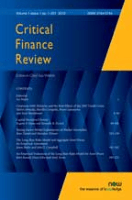
Critical Finance Review
Transforming finance through critical analysis and innovative thought.Critical Finance Review is a premier academic journal dedicated to advancing the field of finance through the publication of high-quality research that spans various dimensions of the discipline. Published by NOW PUBLISHERS INC, this journal has quickly established itself as a leading source of innovative finance scholarship, achieving a notable Q1 classification in the 2023 finance category. Operating under a rigorous peer-review process, the journal ensures the academic integrity and relevance of its content, which attracts contributions from both emerging and established scholars. With an ISSN of 2164-5744 and E-ISSN 2164-5760, it is accessible to a global audience, though it operates under traditional access models. The journal welcomes a diverse range of topics including, but not limited to, risk management, financial markets, and quantitative finance, making it an essential resource for researchers, professionals, and students who are keen to explore the complexities of financial systems and develop new insights in the ever-evolving landscape of finance. Based in the United States, Critical Finance Review holds a significant position within the academic community, fostering a collaborative environment that encourages innovative thinking and practical applications of financial theories.
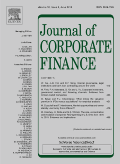
JOURNAL OF CORPORATE FINANCE
Advancing the Frontiers of Corporate Finance ResearchJOURNAL OF CORPORATE FINANCE, published by Elsevier, is a premier academic journal that represents the forefront of research in the fields of corporate finance, economics, and management strategies. With an impressive Q1 ranking across multiple categories and a 95th percentile standing in Scopus rankings, this journal is pivotal for advancing knowledge and fostering discourse among scholars, practitioners, and students globally. The Journal has been in continuous publication since 1994 and welcomes submissions that contribute to the understanding of corporate finance and related disciplines. Although it operates under a traditional access model, the Journal offers a rich repository of research outcomes pivotal for informed decision-making in corporate environments. Researchers and professionals looking to enhance their understanding of contemporary finance phenomena will find the JOURNAL OF CORPORATE FINANCE an invaluable resource.
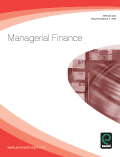
MANAGERIAL FINANCE
Unlocking Strategies for Contemporary Financial Challenges.MANAGERIAL FINANCE is a prestigious academic journal published by Emerald Group Publishing Ltd, focused on the areas of finance, management, and strategy. With an ISSN of 0307-4358 and an E-ISSN of 1758-7743, this journal has carved a niche for itself within the business and financial sectors, achieving a commendable Q2 category ranking across multiple domains, including Business, Management and Accounting, Finance, and Strategy and Management, as of 2023. The journal aims to provide a platform for insightful research and critical analysis while fostering an understanding of contemporary financial practices and theories. With its wide-ranging scope, it serves as a vital resource for researchers, professionals, and students alike, looking to stay abreast of the latest trends and challenges in managerial finance. The editorial board is committed to maintaining academic rigor, ensuring that articles published are of the highest quality and relevance to the field. By bridging the gap between theory and practice, MANAGERIAL FINANCE is an essential reference for anyone involved in financial decision-making and strategic management.

Financial Innovation
Pioneering Insights in Financial InnovationFinancial Innovation, published by Springer, is a premier open access journal that has been contributing to the fields of finance and management of technology and innovation since its inception in 2015. With an impressive Q1 category ranking in both Finance and Management of Technology and Innovation, the journal places itself at the forefront of academic research, reflected in its Scopus rankings—#17 out of 317 in Finance (94th percentile) and #29 out of 289 in Management of Technology and Innovation (90th percentile). Centered in Germany, this journal aims to disseminate high-quality research that fosters theoretical and practical advancements within its scope, encouraging exchanges between academia and industry. The open access model enhances visibility and accessibility of published research, thus playing a critical role in shaping the future of financial practices and technology management. For researchers, professionals, and students alike, Financial Innovation remains essential for staying abreast of cutting-edge developments and trends in these dynamic fields.
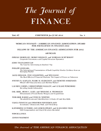
JOURNAL OF FINANCE
Shaping the future of finance through impactful research.JOURNAL OF FINANCE, published by Wiley, stands as a premier academic journal in the fields of finance, economics, and accounting. With a history dating back to 1946, the journal has consistently delivered impactful research that shapes financial theory and practice, boasting an impressive impact factor reflective of its high citation rate. Its Quartile 1 ranking in Accounting, Economics and Econometrics, and Finance illustrates its leading position within these disciplines. Although not an open access publication, the journal continues to be indispensable for researchers, professionals, and students seeking to advance their understanding and knowledge through rigorous empirical analysis and comprehensive reviews. With an esteemed global readership, the JOURNAL OF FINANCE remains committed to fostering the dissemination of innovative financial research well into 2024 and beyond.
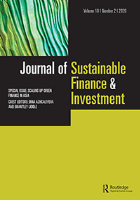
Journal of Sustainable Finance & Investment
Shaping the Future of Finance with Sustainability in MindThe Journal of Sustainable Finance & Investment, published by Routledge Journals, Taylor & Francis Ltd, stands as a premier academic platform dedicated to advancing research in sustainable finance and investment practices. With an ISSN of 2043-0795 and E-ISSN of 2043-0809, this journal has carved out a significant niche in the landscape of interdisciplinary finance studies since its inception in 2011. Located in the United Kingdom, it is distinguished by its impressive quartile ranking of Q1 across prominent categories, including Business and International Management, Economics, Econometrics and Finance, and Finance. The journal boasts an exceptional Scopus rank, sitting in the top-tier percentile in multiple fields, underscoring its rigorous academic standards and the impact of its published research. Aimed at researchers, professionals, and students passionate about finance's role in promoting sustainability, the journal prioritizes innovative studies that interface financial systems with social and environmental imperatives. Although it currently does not offer Open Access, it remains a crucial resource for accessing cutting-edge insights and shaping sustainable investment practices globally.

Asia-Pacific Financial Markets
Charting New Territories in Financial ResearchAsia-Pacific Financial Markets is a distinguished academic journal published by SPRINGER, dedicated to advancing the field of finance research in the Asia-Pacific region. With an ISSN of 1387-2834 and an E-ISSN of 1573-6946, this journal fosters scholarly discourse on contemporary financial markets, investment strategies, and economic policy implications. Situated within the Q3 category in Finance for 2023, it ranks #140 out of 317 in the Scopus database, reflecting its growing significance and impact within the financial research community, as evidenced by its 55th percentile ranking. Since its inception in 1996, the journal has served as a pivotal platform for researchers, professionals, and students alike, featuring rigorous empirical studies and theoretical frameworks that address emerging financial trends and challenges. While it operates under a subscription model, the journal's comprehensive scope and commitment to high academic standards make it an essential resource for anyone looking to deepen their understanding of finance in the dynamic Asia-Pacific landscape.

JOURNAL OF FINANCIAL AND QUANTITATIVE ANALYSIS
Catalyzing Innovation in Quantitative Financial ResearchJOURNAL OF FINANCIAL AND QUANTITATIVE ANALYSIS, published by Cambridge University Press, is a premier peer-reviewed journal that has been at the forefront of the finance and economics fields since its inception in 1966. With a notable impact factor reflecting its Q1 status in Accounting, Economics and Econometrics, and Finance for 2023, the journal is recognized for its substantial contributions to both theoretical and empirical research. Researchers and practitioners alike benefit from its comprehensive scope, addressing critical issues in financial analysis and quantitative methods. Although the journal does not currently offer open access, it remains widely accessible through institutional subscriptions. The editorial team is committed to fostering rigorous academic discussions that shape the future of finance and economics, making it an essential resource for academics, students, and industry professionals seeking to deepen their understanding of these vital disciplines. For more than five decades, this journal has continued to be an indispensable platform for disseminating influential research, thus solidifying its role as an essential cornerstone in the financial and quantitative analysis community.